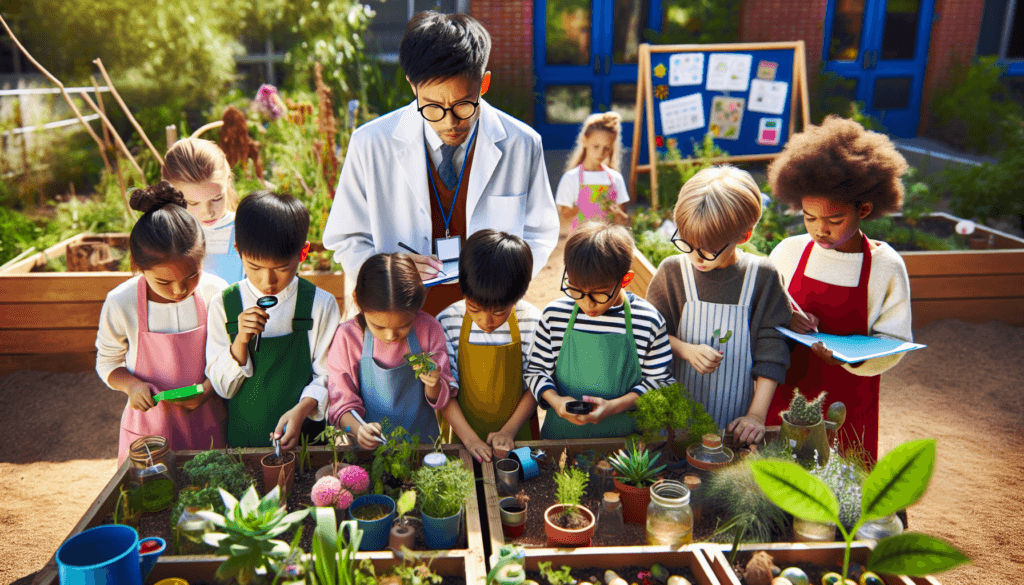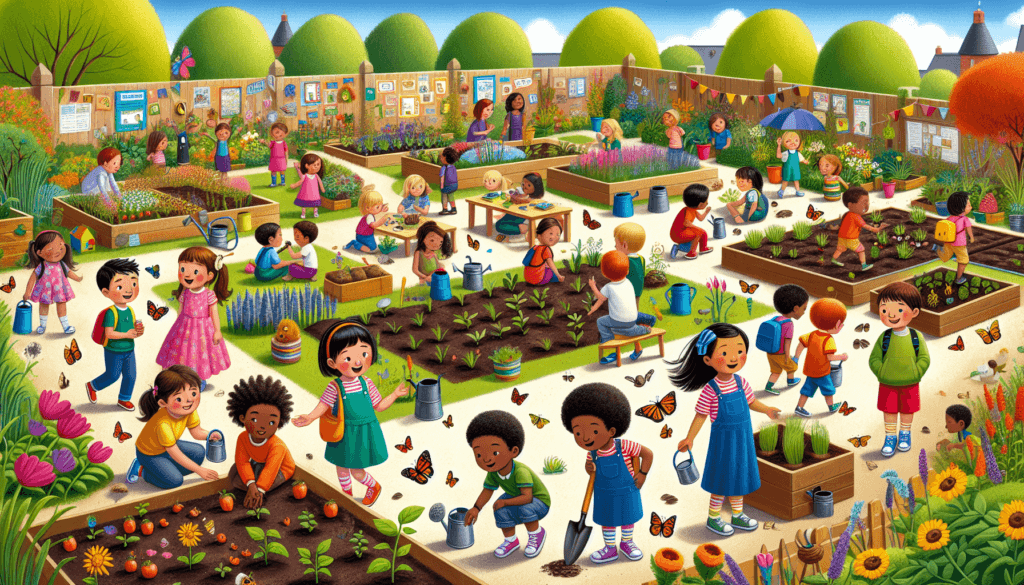Imagine a world where children not only know how to solve mathematical equations and recite historical events, but also have the practical skills to grow their own food and understand the importance of sustainable living. It’s a world where school gardens have become an integral part of education, helping to foster curiosity, critical thinking, and a deeper understanding of the natural world. But can school gardens truly make our children smarter? Let’s explore the research and evidence behind this innovative approach to education, and discover how school gardens hold the potential to nurture brighter minds.

Benefits of School Gardens
School gardens offer numerous benefits for students, starting with improved academic performance. Research has shown that students who engage in hands-on gardening activities are more likely to demonstrate higher levels of academic achievement across various subjects. This is because working in a garden encourages experiential learning, where students can apply concepts they have learned in the classroom to real-life situations. Through observation, experimentation, and problem-solving, students can deepen their understanding of subjects such as biology, botany, and environmental science.
In addition to improved academic performance, school gardens also enhance cognitive skills. When students interact with plants, they engage in sensory experiences that stimulate their cognitive development. Gardening tasks like planting, weeding, and harvesting require critical thinking, spatial awareness, and problem-solving abilities. The process of caring for and nurturing plants also helps develop patience and attention to detail.
Moreover, school gardens can foster the development of a growth mindset. By cultivating plants, students learn that effort, perseverance, and resilience are necessary for growth and success. They witness firsthand the connection between their actions and the outcomes they achieve. This understanding encourages them to embrace challenges, learn from failure, and strive for continuous improvement in all areas of their lives.
One of the most notable benefits of school gardens is the increased creativity and problem-solving abilities they cultivate in students. Gardening activities provide students with a unique opportunity to think creatively and find innovative solutions to problems. For example, when faced with limited space, students may come up with creative ideas like vertical gardening or companion planting. This fosters their ability to think outside the box, adapt to different circumstances, and find sustainable solutions.
Physical and Mental Health
School gardens also have significant impacts on the physical and mental health of students.
Firstly, promoting physical activity is a key benefit of school gardens. Engaging in gardening tasks requires students to be active, performing physical activities such as digging, planting, and watering. These activities provide an opportunity for students to get exercise, improving their overall fitness levels. Regular physical activity in the garden can also contribute to the prevention of childhood obesity and related health issues.
Furthermore, school gardens offer improved nutrition opportunities. When students participate in growing their own food, they develop a deeper appreciation for fruits and vegetables. Students are more likely to consume and enjoy fresh produce when they have been involved in its growth. This exposure to diverse fruits and vegetables encourages healthy eating habits and provides essential nutrients for their growing bodies.
Reduced stress and anxiety is another benefit of school gardens. Spending time in nature has been proven to have a calming effect on the human mind. The natural environment of a garden creates a peaceful and serene atmosphere that helps students relax and recharge. Gardening can serve as a therapeutic outlet, allowing students to connect with nature, relieve stress, and improve their overall mental well-being.
In addition to reducing stress, school gardens can enhance students’ mental well-being. Working with plants and observing their growth can instill a sense of purpose, accomplishment, and pride in students. The act of nurturing and caring for living organisms can also foster empathy, compassion, and a sense of interconnectedness with the natural world. These positive emotions contribute to students’ overall emotional and psychological well-being.

Environmental Awareness and Stewardship
School gardens play a crucial role in promoting environmental awareness and stewardship among students. By engaging in hands-on learning about ecosystems, students develop a deeper understanding of the intricate relationships between plants, animals, and the environment. They witness the interdependence of different species and the vital role each organism plays in maintaining a healthy ecosystem.
Furthermore, school gardens help students understand the importance of biodiversity. They learn that a diverse range of plant and animal species is essential for a sustainable and balanced ecosystem. Through plant selection, students can actively contribute to the preservation of biodiversity by growing a variety of native and pollinator-friendly plants.
Appreciation for nature and environmental sustainability is another significant benefit of school gardens. Interacting with the natural world on a daily basis cultivates a sense of wonder and curiosity in students. They develop a deep appreciation for the beauty and complexity of nature, fostering a desire to protect and conserve it for future generations. School gardens provide a tangible way for students to connect with the environment and actively participate in sustainable practices.
To fulfill their potential as environmental stewards, students need to understand the importance of conservation efforts. School gardens offer an ideal platform for teaching students about sustainable gardening practices, such as composting, rainwater harvesting, and organic pest control. By implementing these practices, students witness firsthand the positive impact they can have on the environment and are empowered to make informed choices in their daily lives.
Interdisciplinary Learning Opportunities
School gardens provide interdisciplinary learning opportunities that integrate various subjects into the curriculum.
Integration with the science curriculum is a natural fit for school gardens. Students have the chance to apply scientific knowledge and principles to observe plant growth, study soil composition, and investigate the impact of environmental factors. They can conduct experiments, record data, and analyze results in a real-world context. This hands-on approach to learning fosters a deeper understanding and appreciation of scientific concepts.
Mathematical applications in planning and measuring are also evident in school gardens. Students can measure the dimensions of garden beds, calculate the amount of soil or fertilizer needed, and monitor plant growth using various mathematical skills. By incorporating math into garden-related activities, students realize the practical applications of mathematical concepts beyond textbook equations.
Language and communication skills can be nurtured through journaling and presentations. Students can keep garden journals, documenting their observations, reflections, and experiences. They can describe plant species, analyze data, and write reflective essays, enhancing their writing and communication abilities. Presentations of gardening projects, both to peers and the wider community, promote public speaking skills and foster confidence in expressing ideas.
Cultural and historical connections can be explored through gardening traditions. School gardens provide an opportunity to learn about the rich history and diverse cultures by studying traditional gardening practices from around the world. Students can explore the different crops, techniques, and rituals associated with gardening in various cultures, fostering an understanding and appreciation of cultural diversity.

Practical Life Skills
School gardens equip students with practical life skills that they can carry with them beyond the classroom.
Gardening and agricultural knowledge is one of the primary practical life skills students gain from school gardens. They acquire a deep understanding of plant life cycles, soil health, and the conditions required for successful growth. This knowledge empowers them to become more self-sufficient and environmentally conscious individuals, capable of growing their own food and making informed choices about sustainable agriculture practices.
Responsibility and accountability are important values instilled through school gardens. When students take ownership of the garden, they learn the importance of fulfilling responsibilities, such as watering plants, weeding, and maintaining garden tools. Through these tasks, students understand the consequences of neglecting their duties and the rewards of being accountable for their actions.
Teamwork and collaboration are essential skills cultivated through school gardens. Gardens often require group effort, with students working together to plan, design, and maintain the garden. They learn to communicate effectively, resolve conflicts, and allocate tasks based on individual strengths and interests. In working collaboratively, students develop a sense of unity and the ability to achieve shared goals.
Patience and perseverance are virtues commonly nurtured in school gardens. Growing plants requires time, patience, and continuous effort. Students must wait for their seeds to germinate, care for the plants as they grow, and persevere through challenges like pests or adverse weather conditions. These experiences teach resilience, determination, and the value of patience in achieving long-term goals.
Positive Impact on Behavioral and Social Development
School gardens have a positive impact on the behavioral and social development of students.
Improved focus and self-regulation are benefits derived from engaging in gardening activities. The calm and quiet environment of a garden facilitates concentration and helps students develop their ability to focus on a specific task. Gardening requires sustained attention, which helps students practice self-regulation skills, such as controlling impulsive behavior and staying on task.
Enhanced respect and empathy toward living beings is an important social-emotional skill cultivated through school gardens. As students engage with plants and observe their growth, they develop a sense of respect for all living beings. They learn to appreciate the value of life, which extends beyond plants to include animals, insects, and the environment as a whole.
Promotion of responsibility and accountability is another benefit of school gardens on students’ behavioral development. When students take on roles and responsibilities in the garden, they learn to be accountable for their actions. They understand the consequences of their decisions and the impact they have on the growth and well-being of plants and the overall garden.
School gardens provide ample opportunities for social interactions and teamwork. Students collaborate and communicate with their peers, sharing ideas, problem-solving, and working together to achieve common goals. They learn to respect diverse perspectives and work effectively in a group setting. These social interactions foster interpersonal skills, improve relationships, and nurture the ability to work effectively as part of a team.

Promotion of Healthy Eating Habits
School gardens play a vital role in promoting healthy eating habits among students.
Exposure to diverse fruits and vegetables is a significant benefit of school gardens. Students have the opportunity to grow and taste a variety of fresh produce they may not have encountered otherwise. By expanding their culinary horizons, students become more willing to try new foods and develop a broader palate. This exposure to diverse fruits and vegetables promotes a well-balanced diet and encourages the consumption of nutrient-rich foods.
Understanding the connection between food and health is another essential lesson learned through school gardens. Students witness firsthand how the quality of food they consume impacts their overall well-being. They learn about the nutritional value of different fruits and vegetables and how these foods provide essential vitamins, minerals, and antioxidants that support their growth and development.
Increased willingness to try new foods is a benefit that arises from school gardens. When students grow their own food, they develop a sense of pride and curiosity about the crops they have cultivated. This sense of ownership and connection to the food encourages students to try new foods they may have previously overlooked or rejected. They become more open-minded and adventurous in their culinary choices.
Development of cooking and meal planning skills is an important outcome of school gardens. Students can apply their knowledge of garden-fresh produce to create nutritious and delicious meals. They learn cooking techniques, recipe adaptation, and meal planning strategies that promote healthy eating habits. These culinary skills empower students to make informed choices about their diets and lead a healthy lifestyle.
Connection to the Natural World
School gardens create a profound connection between students and the natural world.
Enhanced understanding of seasons and natural cycles is a significant benefit of school gardens. Through firsthand experience, students learn about the changing seasons and their impact on plant growth. They observe how plants respond to temperature changes, daylight hours, and seasonal variations. This understanding fosters a deep appreciation for the cyclical nature of the world and the importance of adapting to change.
Fostered sense of wonder and curiosity is another outcome of school gardens. Students witness the magic of a seed sprouting into a plant and the miracle of pollination that leads to the formation of fruits and vegetables. These experiences nurture a sense of wonder in students and inspire their curiosity about the natural world. The garden becomes a living classroom where they can explore, question, and learn.
Encouragement of outdoor exploration is a significant benefit of school gardens. Gardens provide a safe and structured environment for students to engage with nature and cultivate a connection to the outdoors. Students can explore the garden, observe insects, birds, and other wildlife, and discover the wonders of their natural surroundings. Outdoor exploration stimulates their senses, encourages physical activity, and provides opportunities for hands-on learning.
Promotion of environmental stewardship is a core value instilled through school gardens. As students engage with the natural world, they develop a sense of responsibility and desire to protect and preserve it for future generations. They witness the impact of their actions on the environment and understand the importance of sustainable practices. School gardens promote an ethos of environmental stewardship, encouraging students to become proactive agents of positive change.

Community Engagement and Outreach
School gardens foster community engagement and outreach, providing both educational and social benefits.
Partnerships with local organizations and businesses are a valuable aspect of school gardens. Collaboration with community stakeholders, such as local farms, gardening centers, or environmental organizations, can offer expertise, resources, and support for school gardens. These partnerships create opportunities for students to connect with professionals in related fields, expanding their knowledge and inspiring future career paths.
Educational resources for families and the community is another contribution of school gardens. Through newsletters, workshops, or open garden days, schools can share information and resources about gardening, sustainability practices, and healthy eating with families and the wider community. These educational initiatives promote a culture of lifelong learning and encourage the adoption of sustainable habits beyond the school grounds.
Sharing harvests with local food banks or markets is a way school gardens can give back to the community. By donating fresh produce, schools can help address food insecurity and provide nutritious options for those in need. This gives students a sense of pride and purpose, knowing they are making a positive impact on the lives of others.
Promoting awareness and involvement in sustainable practices is a core goal of school gardens. By showcasing sustainable gardening techniques and demonstrating the benefits of environmentally friendly practices, school gardens inspire the community to adopt similar approaches. This collective effort towards sustainability creates a stronger, greener community, enhancing quality of life for all.
Potential Challenges and Solutions
While school gardens offer numerous benefits, there are potential challenges to consider. However, with proactive planning and collaboration, these challenges can be addressed effectively.
Limited space and resources pose a common challenge for school gardens. Many schools have limited outdoor space, making it challenging to establish a garden. However, creative solutions such as container gardening, vertical gardening, or rooftop gardens can maximize available space. Additionally, seeking community partnerships for resources, such as soil, tools, and seeds, can help alleviate financial constraints.
Maintenance during school breaks can be a challenge, especially when gardens require regular care. Developing a maintenance plan that involves students, staff, and volunteers can ensure that gardens are well-kept even during breaks. Tasks such as watering, weeding, and pest control can be assigned and rotated among individuals or groups to distribute the responsibility.
Incorporating gardening into the curriculum may require adjustments and coordination across different subjects. Collaboration between teachers from various disciplines can help integrate gardening seamlessly into existing curriculum frameworks. By finding connections and aligning garden-related activities with learning objectives, teachers can promote cross-curricular learning experiences.
Involvement and support from teachers, parents, and the community are crucial for the success of school gardens. Overcoming resistance or lack of awareness may require ongoing communication and engagement efforts. Providing training and resources for teachers, organizing gardening workshops for parents, and actively seeking community involvement can foster a sense of ownership, support, and enthusiasm for school gardens.
In conclusion, school gardens offer a wide range of benefits for students, impacting their academic performance, physical and mental health, environmental awareness, interdisciplinary learning, practical life skills, behavioral and social development, healthy eating habits, connection to the natural world, and community engagement. By creating a nurturing and educational environment, school gardens empower students to become active participants in their own learning, while fostering a deeper connection and appreciation for the world around them.


